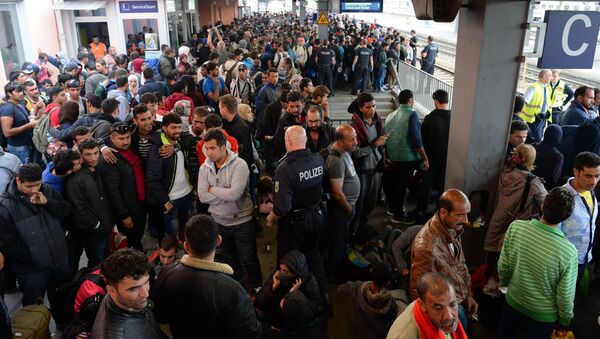Germany pays the highest social benefits across Europe, providing false incentives, the CSU's Alexander Dobrindt told the German Die Zeit newspaper.
"We want to cut social benefits for asylum seekers so that Germany no longer remains a magnet for refugees from all over the world," the politician said, cited by the newspaper.
In a recent resolution, the CSU proposed to extend the period during which asylum seekers receive only basic assistance from 15 to 36 months. The party also demanded a reduction in financial assistance for those refugees whose asylum applications were rejected.
READ MORE:Germany Cites Denmark as Role Model in Dealing With Refugees
In addition, representatives of the CSU argued that applicants should not receive asylum or protection status until their identity has been established beyond doubt.
"When we accept people, we need to know who they are," Die Zeit wrote, referring to the document.
Among other things, the resolution calls for a compulsory age check of allegedly underage refugees.
"All possible means" could be used for this purpose, including "mobile phone inquiries" and "medical screenings," Dorbrindt argued.
The latest suggestion, however, has caused vivid debates and criticism in Germany. Especially, medical workers seriously questioned the idea of compulsory medical examinations for refugees.
READ MORE: Number of Illegal Refugees Entering Germany Drops Fourfold in 2017 — Reports
"If you do it for every refugee, that would be an interference with human well-being," the president of the German Medical Association, Frank Ulrich Montgomery told Süddeutsche Zeitung, after the institution rejected the idea of such examinations in order to identify asylum seekers' age, for instance by taking an X-ray of their wrists.
"An X-ray without medical indication is an invasion of physical integrity," Montgomery said, adding that such a procedure is only permissible in the context of criminal proceedings.
The CSU has long been known for its tough stance on immigration, demanding a cap on the number of refugees entering the country; a stance that has become a major roadblock between the Bavarian party and its allies, including Angela Merkel's CDU with which it forms a political alliance (CDU/CSU).
The party's rhetoric has become even harsher after a recent incident involving a young Afghan man stabbed a 15-year-old German girl to death in a grocery store in western Germany.


